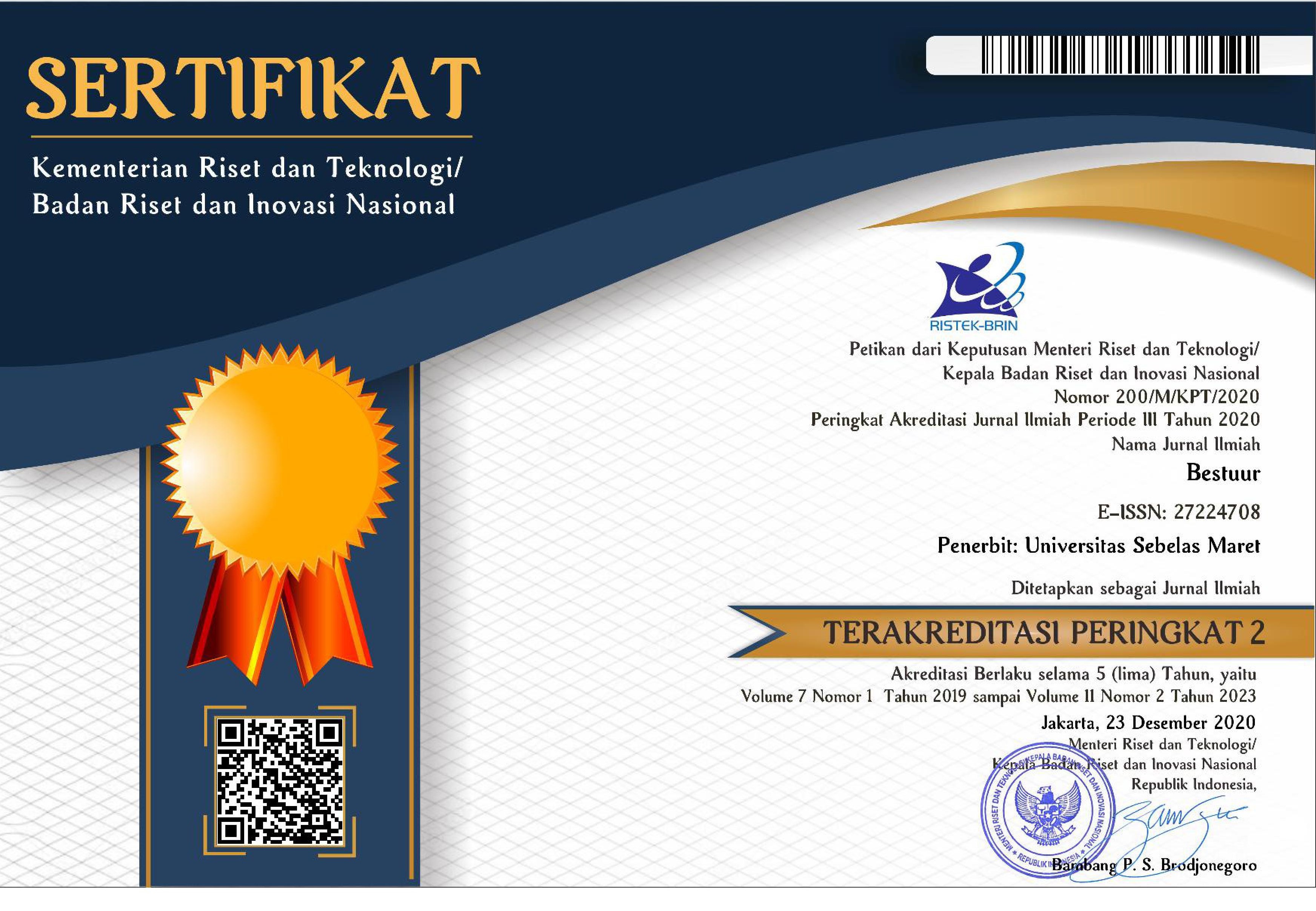The Legal Reform Policy on the Shariah Supervisory Board Role’s in Indonesian Shariah Banks
Abstract
As Muslim majority country, Indonesia experiences the mushrooming of banks based on Islamic values (called shariah banking). The existence of sharia banking is followed by legal policies intended to support the progress of the business sector, including regulations regarding the Sharia Advisory Board, but the question is whether the policy is effective in the development of sharia banking in Indonesia. Adherent to that context, this study aims to examine the issues faced by the Sharia Supervisory Board in Indonesia. This study argues that there are at least fifth substantial problems related to the policies of the Sharia Supervisory Board in Indonesia, namely: (1) not all Shariah Supervisory Boards in Islamic business units have supported by a strong legal basis on which their operations are inducted to; (2) members of the Shariah Supervisory Board are appointed mostly based on their charisma and popularity in society, not of their knowledge and experience in related field; (3) ideally Shariah Supervisory Board must have recognized the banking system before becoming Shariah Supervisory Board, but the basic knowledge is not easy to understand when entering on technical issues; (4) many Shariah Supervisory Boards are not focused on shariah banks supervision duty because of their multi profession; (5) lack of advice related to product innovation and social needs issues.
Keywords
Full Text:
PDFReferences
Abdullah, W. A. W., Percy, M., & Stewart, J. (2015). Determinants of voluntary corporate governance disclosure: Evidence from Islamic banks in the Southeast Asian and the Gulf Cooperation Council regions. Journal of Contemporary Accounting & Economics, 11(3), 262–279. https://doi.org/10.1016/j.jcae.2015.10.001
Bitar, M., & Tarazi, A. (2019). Creditor rights and bank capital decisions: Conventional vs. Islamic banking. Journal of Corporate Finance, 55, 69–104. https://doi.org/10.1016/j.jcorpfin.2018.11.007
Elamer, A. A., Ntim, C. G., Abdou, H. A., & Pyke, C. (2020). Sharia supervisory boards, governance structures and operational risk disclosures: Evidence from Islamic banks in MENA countries. Global Finance Journal, 46, 100488. https://doi.org/10.1016/j.gfj.2019.100488
Hassan, M. K., & Aliyu, S. (2018). A contemporary survey of islamic banking literature. Journal of Financial Stability, 34, 12–43. https://doi.org/10.1016/j.jfs.2017.11.006
Izzeldin, M., Johnes, J., Ongena, S., Pappas, V., & Tsionas, M. (2021). Efficiency convergence in Islamic and conventional banks. Journal of International Financial Markets, Institutions and Money, 70, 101279. https://doi.org/10.1016/j.intfin.2020.101279
Juhro, S. M., Narayan, P. K., Iyke, B. N., & Trisnanto, B. (2020). Is there a role for Islamic finance and R&D in endogenous growth models in the case of Indonesia? Pacific-Basin Finance Journal, 62, 101297. https://doi.org/10.1016/j.pacfin.2020.101297
Kamla, R., & Alsoufi, R. (2015). Critical Muslim Intellectuals’ discourse and the issue of ‘Interest’ (ribā): Implications for Islamic accounting and banking. Accounting Forum, 39(2), 140–154. https://doi.org/10.1016/j.accfor.2015.02.002
Kamla, R., & Haque, F. (2019). Islamic accounting, neo-imperialism and identity staging: The Accounting and Auditing Organization for Islamic Financial Institutions. Critical Perspectives on Accounting, 63, 102000. https://doi.org/10.1016/j.cpa.2017.06.001
Lassoued, N., Attia, M. B. R., & Sassi, H. (2018). Earnings management in islamic and conventional banks: Does ownership structure matter? Evidence from the MENA region. Journal of International Accounting, Auditing and Taxation, 30, 85–105. https://doi.org/10.1016/j.intaccaudtax.2017.12.003
Mateev, M., & Bachvarov, P. (2021). Regulation, ownership and bank performance in the MENA region: Evidence for Islamic and conventional banks. Emerging Markets Review, 47, 100789. https://doi.org/10.1016/j.ememar.2020.100789
Mollah, S., & Zaman, M. (2015). Shari’ah supervision, corporate governance and performance: Conventional vs. Islamic banks. Journal of Banking & Finance, 58, 418–435. https://doi.org/10.1016/j.jbankfin.2015.04.030
Qoyum, A., Sakti, M. R. P., Thaker, H. M. T., & AlHashfi, R. U. (2021). Does the islamic label indicate good environmental, social, and governance (ESG) performance? Evidence from sharia-compliant firms in Indonesia and Malaysia. Borsa Istanbul Review. https://doi.org/10.1016/j.bir.2021.06.001
Rizvi, S. A. R., Narayan, P. K., Sakti, A., & Syarifuddin, F. (2020). Role of Islamic banks in Indonesian banking industry: an empirical exploration. Pacific-Basin Finance Journal, 62, 101117. https://doi.org/10.1016/j.pacfin.2019.02.002
Saeed, S. M., Abdeljawad, I., Hassan, M. K., & Rashid, M. (2021). Dependency of Islamic bank rates on conventional rates in a dual banking system: A trade-off between religious and economic fundamentals. International Review of Economics & Finance. https://doi.org/10.1016/j.iref.2021.09.013
Salem, R., Usman, M., & Ezeani, E. (2021). Loan loss provisions and audit quality: Evidence from MENA Islamic and conventional banks. The Quarterly Review of Economics and Finance, 79, 345–359. https://doi.org/10.1016/j.qref.2020.07.002
Shaban, M., Duygun, M., Anwar, M., & Akbar, B. (2014). Diversification and banks’ willingness to lend to small businesses: Evidence from Islamic and conventional banks in Indonesia. Journal of Economic Behavior & Organization, 103, S39–S55. https://doi.org/10.1016/j.jebo.2014.03.021
Siswantoro, D. (2014). Analysis of Islamic Bank’s Performance and Strategy After Spin-off as Islamic Full-fledged Scheme in Indonesia. Procedia - Social and Behavioral Sciences, 164, 41–48. https://doi.org/10.1016/j.sbspro.2014.11.048
Trinugroho, I., Risfandy, T., & Ariefianto, M. D. (2018). Competition, diversification, and bank margins: Evidence from Indonesian Islamic rural banks. Borsa Istanbul Review, 18(4), 349–358. https://doi.org/10.1016/j.bir.2018.07.006
Trinugroho, I., Santoso, W., Irawanto, R., & Pamungkas, P. (2021). Is spin-off policy an effective way to improve performance of Islamic banks? Evidence from Indonesia. Research in International Business and Finance, 56, 101352. https://doi.org/10.1016/j.ribaf.2020.101352
Wasiaturrahma, Sukmana, R., Ajija, S. R., Salama, S. C. U., & Hudaifah, A. (2020). Financial performance of rural banks in Indonesia: A two-stage DEA approach. Heliyon, 6(7), e04390. https://doi.org/10.1016/j.heliyon.2020.e04390
Zuhroh, I., Ismail, M., & Maskie, G. (2015). Cost Efficiency of Islamic Banks in Indonesia – A Stochastic Frontier Analysis. Procedia - Social and Behavioral Sciences, 211, 1122–1131. https://doi.org/10.1016/j.sbspro.2015.11.150
DOI: https://doi.org/10.20961/bestuur.v9i2.55173
Refbacks
- There are currently no refbacks.
Copyright (c) 2021 Devi Triasari, Francesco de Zwart

This work is licensed under a Creative Commons Attribution 4.0 International License.
|











_CROSREF.jpg)




